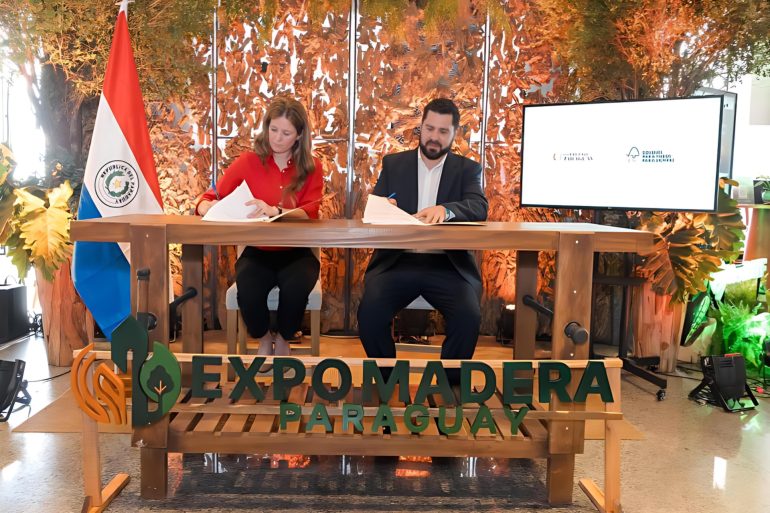Paraguay has taken a historic step with the signing of its first global governmental alliance to promote sustainable forest managemen. This agreement commits the country to higher environmental standards, improved governance, and greater recognition of forests as a driver of economic and social development.
The agreement was signed between the National Forestry Institute (INFONA) and the Forest Stewardship Council (FSC), within the framework of Expo Madera 2025. This collaboration aims to strengthen national technical capacities to ensure that Paraguayan forestry production meets internationally recognised sustainable criteria.
Context and figures of the forestry sector
Paraguay has positioned itself as an increasingly relevant actor in the international trade of forestry products. Recently, in 2024, exports from the sector reached approximately US$9.2 million, with around 20,000 tonnes of products shipped abroad. The main products were charcoal and briquettes, which represented the majority of exported volume, followed by plywood and sawn timber.
The principal destinations were the United States, the United Kingdom, Brazil, Uruguay, and Israel, reflecting both diversification of markets and growing interest in Paraguayan forestry products.
In addition, Paraguay has identified more than eight million hectares suitable for forestry plantations, both in the Eastern and Western regions, underlining the vast potential to expand sustainable production.
How can this alliance benefit Paraguay?
The alliance with the FSC may allow Paraguayan forestry products to be recognised as sustainable in demanding markets. This means that certified timber, plywood, or charcoal could achieve better prices, gain access to new markets, and comply with international regulations, which would generate higher income for producers and exporters.
Sustainable forest management involves practices that protect ecosystems, watersheds, flora, and fauna, reduce illegal deforestation, and encourage the restoration of degraded areas. This has a direct impact on water quality, climate change mitigation, and the preservation of biodiversity, providing a collective benefit for the entire population.
The forestry sector already generates thousands of direct jobs, according to recent data nearly 5,890 formal positions, with a multiplier effect on communities involved in plantations, manufacturing, transport, and associated services. With international certification, investment in forestry industries may increase, which would improve working conditions and create opportunities for young people and entrepreneurs in rural areas.
Challenges and next steps
For these benefits to materialise, it will be necessary to facilitate access to certification for small producers without excessive costs. It will also be essential to provide technical assistance and training to encourage reforestation with native or mixed species.
Another challenge will be to ensure that implementation respects the rights of indigenous and rural communities, fostering their genuine participation in the process. Finally, economic and fiscal incentives must be created to make sustainable forest management attractive to all actors in the sector.
Strengthening forest management
With this alliance, INFONA is expected to reinforce its capacity to control, monitor, and regulate the use of forestry resources with greater transparency. Systems of monitoring, traceability, regulatory compliance, and technical training will be improved, reducing the risks of unsustainable or illegal practices.
In the same direction, initiatives such as A Todo Pulmón, which for fifteen years has promoted tree planting and environmental awareness.


